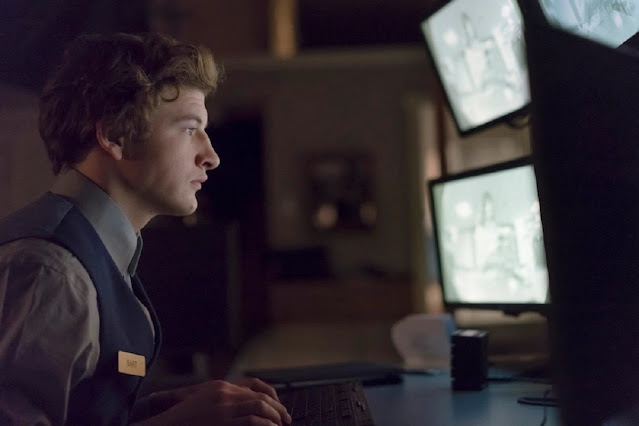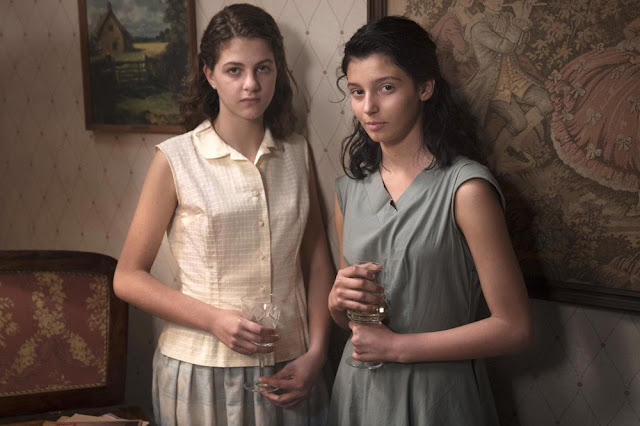Pose - Temporadas 1 y 2
(Español / English)
Temporada 1
Pose retrata la movida trans y drag afrodescendiente y latina en Nueva York a mediados de los años 80s, en plena era Reagan y de la expansión del SIDA.
Por un lado ingresamos al mundo de las “Casas, donde una
mujer trans alberga a otras chicas trans y chicos gays o no, erigiéndose en su
“madre” o protectora y conformando verdaderas familias sustitutas para personas
en general expulsadas de sus familais biológicas por sus elecciones de género y
sexuales y en serios apuros económicos. Piénsese en los numerosos factores de
marginación y discriminación (incluso dentro de la propia comunidad gay) con
que cargan estas personas y mucho más en esa época.
Por otro lado, Ryan Murphy nos introduce a través de esta
serie en la cultura del Ball (Ball Culture): en algunos clubes nocturnos, las
Casas competían en desfiles temáticos para los cuales sus integrantes se
preparaban y producían, con un jurado que atribuirá trofeos. El Ball constituía
un espacio tanto de identificación y reafirmación social como de resistencia, así
como también de satirización de ciertos estándares culturales de la época.
Pose es una historia coral con una notable galería de
personajes, destacándose Elektra Abundance (la imponente Dominique Jackson)
una “madre” ciertamente despótica pero
con buen pasar económico, reina de la Casa Abundance, Blanca (MJ Rodríguez), que
abandona a Elektra para fundar su propia Casa Evangelista junto con la bella
Angel (Indya Moore) y Pray Tell (Billy Porter), modista y mordaz maestro de
ceremonias de los Balls; a través de él y su pareja la serie nos introduce en
la dolorosa y terminal realidad del SIDA en esa época.
La Era Reagan también se hace presente en la figura de Stan
Bowes (Evan Peters), un joven y ascendente ejecutivo casado y con dos hijos que
trabaja en las Trump Towers que entabla una relación con Angel y lidia con su
despiadado jefe.
Lejos de las estridencias y arbitrariedades de otras ficciones suyas, un Ryan Murphy muy bien asesorado nos entrega una historia madura, con personajes interesantes y muy bien delineados, grandes actuaciones, varios diálogos extraordinarios y todo el glamour y el humor feroz de sus Balls.
Temporada 2
Todos los personajes de las tres Casas se hallan presentes en la temporada 2, que comienza a principios de los 90s con un capítulo muy potente.
Se puede decir que los capítulos de esta temporada son más
independientes, lo que genera cierta discontinuidad narrativa y algunos baches en
la calidad de la serie. Pero también, en esta temporada se encuentra uno de los
capítulos más encantadores de toda la serie y ofrece momentos musicales y un capítulo
final extraordinarios.
Continúa la ominosa presencia del HIV-SIDA a lo que se suma la
irrupción del movimiento ACT UP, un grupo activista de acción directa para promover
la investigación científica y la profilaxis del SIDA y denunciar la oposición de ciertos
factores de poder político y de la Iglesia empecinados en considerar el tema “un
problema de los gays”.
Se producen interesantes reacomodamientos de algunos vínculos
y el camino del éxito para algunos integrantes de la Casa Evangelista tiene sus
altibajos. Se incorpora una villana a cargo de Patti LuPone que aporta el tono
tremebundo característico de otras ficciones de Murphy y que por suerte no
afecta el tono de la serie.
Hay momentos dolorosos y cierta “necrofilia” con algunos planteos
y licencias narrativos y ciertos parlamentos
con llamados a la resiliencia quizás más explícitos y redundantes que en la temporada 1.
Y dejo el final para hablar de los Balls: mucho mejor
producidos y glamorosos, deparan algunos momentos que se hayan entre los
mejores de la serie, por su humor y emoción.
En conjunto, la temporada 2 resiste el cotejo con la 1.
Mientras, esperamos el estreno de la tercera.
Season 1
Pose portrays the Afro-descendant and Latino trans and drag movement in New York in the mid-1980s, in the middle of the Reagan era and the spread of AIDS.
On the one hand, we enter the world of "Houses”, where
a trans woman shelters other trans girls and boys, gay or not, becoming
their" mother" or protector and forming true substitute families for
people generally expelled from their biological families for their gender and
sexual choices and in serious financial distress. Think of the many factors of
marginalization and discrimination (even within the gay community itself) that
these people carry and much more at that time.
On the other hand, Ryan Murphy introduces us through this
series in the culture of Ball (Ball Culture): in some nightclubs, the Houses
competed in thematic parades for which their members prepared and produced,
with a jury that will award trophies . The Ball constituted a space both for
identification and social reaffirmation as well as for resistance, as well as
for the satirization of certain cultural standards of the time.
Pose is a choral story with a remarkable gallery of
characters, standing out Elektra Abundance (the imposing Dominique Jackson) a
"mother" certainly despotic but with a good economic time, queen of
the Abundance House, Blanca (MJ Rodríguez), who leaves Elektra to founding his
own Evangelist House with the beautiful Angel (Indya Moore) and Pray Tell
(Billy Porter), dressmaker and scathing ringmaster of the Balls; Through him
and his partner, the series introduces us to the painful and terminal reality
of AIDS at that time.
The Reagan Era is also present in the figure of Stan Bowes
(Evan Peters), a young and rising executive married with two children who works
in the Trump Towers who develops a relationship with Angel and deals with his
ruthless boss.
Far from the stridency and arbitrariness of his other
fictions, a very well advised Ryan Murphy gives us a mature story, with
interesting and very well-delineated characters, great performances, several
extraordinary dialogues and all the glamor and fierce humor of his Balls.
Season 2
It can be said that the episodes of this season are more independent, which generates a certain narrative discontinuity and some bumps in the quality of the series. But also, this season is one of the most enchanting chapters of the entire series and offers extraordinary musical moments and a final chapter.
The ominous presence of HIV-AIDS continues, to which is added the irruption of the ACT UP movement, a direct action activist group to promote scientific research, prophylaxis and medical care of the still deadly disease and denounce the opposition of certain factors of political power and of the Church determined to consider the issue "a problem of gays."
There are interesting rearrangements of some links or
relationships between the characters and the path of success for some members
of the Casa Evangelista has its ups and downs. A villain is incorporated by
Patti LuPone who brings the terrifying tone characteristic of other Murphy
fictions and fortunately does not affect the tone of the series.
And I leave until the end to talk about the Balls: much better produced and glamorous and that they hold some moments that are among the best of the series, for their humor and emotion.
Altogether, season 2 resists the comparison with 1.
Meanwhile, we await the premiere of the third.







Comentarios
Publicar un comentario
Mensajes sujetos a moderación